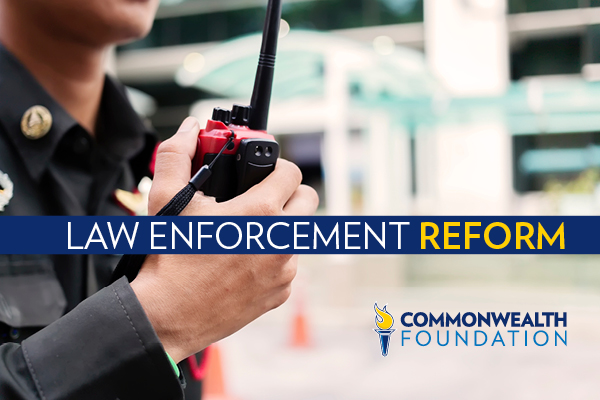Commentary

Pa. Tackles Two New Law Enforcement Reforms
The House Judiciary Committee will consider two pieces of law enforcement reform legislation on Monday morning. Their aim is to strengthen transparency, rebuild trust, and equip dedicated officers to maintain community safety.
Below is a summary of these bills.
1. Increasing transparency in law enforcement hiring
House Bill 1841 (Rep. Harry Readshaw) helps police departments vet potential bad actors before they are hired and as they move among police departments.
Law enforcement applicants undergo background checks, however, former employers do not always turn over records for fear of civil liability charges. This proposal grants former employers good faith immunity and permits a court to compel the release of employment information with appropriate protections for the job applicant.
Over 90% of officers are estimated to police American streets without being investigated for misconduct. Yet, many of those investigated are repeat offenders. According to a 2019 report from the Invisible Institute and USA Today:
Some officers are consistently under investigation. Nearly 2,500 have been investigated on 10 or more charges. Twenty faced 100 or more allegations yet kept their badge for years.
A recent study, published in the Yale Law Journal finds these officers are more likely ”to be fired from their next job or to receive a complaint for a ‘moral character violation.’” A simple failure to properly track and share personnel records means these officers may move from department to department without receiving the appropriate discipline.
The committee may also amend the bill to include reforms from House Bill 1666 (Rep. Chris Rabb) establishing a statewide officer employment database in the Attorney General’s office. Specifically, law enforcement agencies would submit—and consult before hiring—an officers’ record of any criminal charges, civil and ethical complaints, disciplinary actions, and the reason and circumstances for separation of services. Officers would have opportunity to contest the records.
Research indicates misconduct can become infectious in a department. A statewide database will help departments to protect their integrity.
2. Enhancing officer training and treatment
House Bill 1910 (Rep. Dan Williams) provides mandatory training for police officers to recognize and address child abuse. This includes training on reporting requirements, available resources, and effective forensic interviewing of abuse victims.
Officers are responsible for enforcing a large criminal code and connecting citizens with the correct services—and it is the role of the legislature and administration to support that duty.
Similarly, HB 1910 may be amended to include reforms found in House Bill 1551 (Rep. Dawkins), which would require law enforcement officers to undergo Post-Traumatic Stress Disorder (PTSD) evaluations biennially and within 30 days of an incident of the use of lethal force. If a licensed mental health professional determines PTSD, the officer shall receive treatment from a licensed physician until symptoms cease, during which time an officer will be assigned to desk duty.
Policing induces extreme stress and often trauma. Officers deserve health support, and our communities will be better protected for it. This legislation can begin the conversation on how to improve policing through better mental health services.
Pennsylvanians are voicing their concern. Whether they are demanding systemic change or defending the countless ways law enforcement effectively keeps communities safe, the common and foundational demands are fairness, equality, and accountability. Encouragingly, lawmakers are taking steps to address constituents’ concerns by pursuing meaningful, balanced policing reform.
The reforms that will be considered on Monday lay the groundwork for a deeper look at responsible policing and how to better equip officers to do their jobs well. As Chairman Kauffman indicates,
These issues are certainly worthy of consideration…I think we’re going to have an appropriate conversation.
And productive conversations about a fairer criminal justice system are exactly what we need right now.